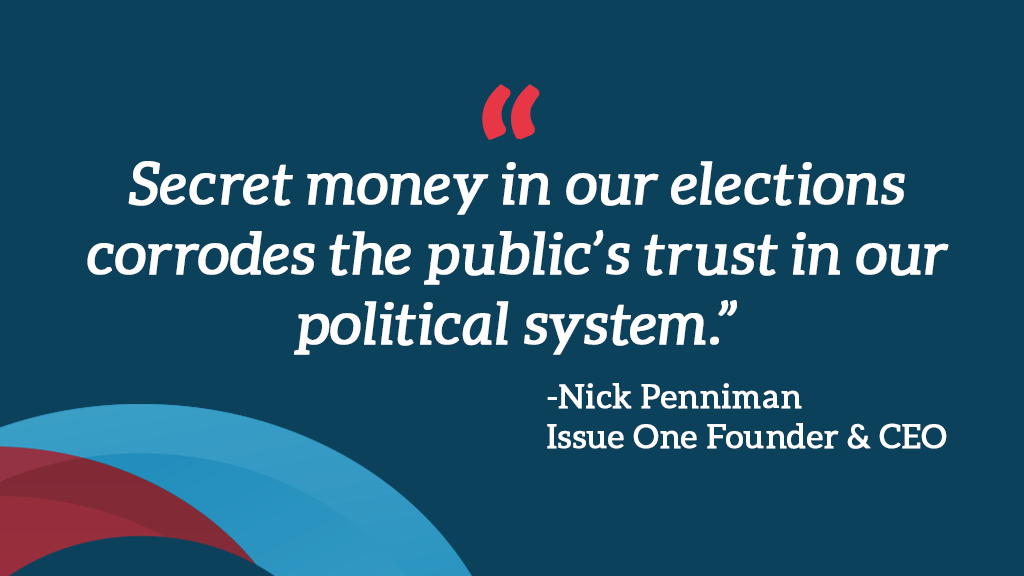Total dark money spending since the U.S. Supreme Court’s Citizens United decision in 2010 will soon eclipse $1 billion, according to an Issue One analysis of data from the Center for Responsive Politics.
This ominous milestone in political spending comes as secretive liberal groups are matching their conservative counterparts nearly dollar-for-dollar ahead of the 2020 election — and may potentially out-spend conservative dark money groups for the second election cycle in a row.
Dark money groups have spent $996 million in election-related expenditures, according to the Center for Responsive Politics, including $33 million — and counting — ahead of the 2020 election. Issue One and the Center for Responsive Politics discussed this development on a Zoom call with reporters on Wednesday.
“Democrats and Republicans alike should be alarmed at secret spending in our elections,” said Issue One Founder and CEO Nick Penniman. “When wealthy donors covertly spend millions of dollars to curry favor and push their pet issues, our democratic processes are distorted. Secret money in our elections corrodes the public’s trust in our political system.”
Conservative groups initially dominated the dark money game. As recently as the 2016 election cycle, conservative dark money groups outspent liberal ones by a factor of nearly 4-to-1, according to the Center for Responsive Politics. And in 2010, the first election in the aftermath of Citizens United, conservative dark money groups outspent liberal ones by roughly 11-to-1.
In the 2018 midterm elections, however, liberal dark money groups outspent conservative groups roughly 2-to-1, as Issue One previously noted. Liberal dark money dominance may repeat itself again this year, as Democrats work to defeat President Donald Trump and win control of both the Senate and House of Representatives.
“Campaigns should not be fought in the shadows,” said Issue One ReFormers Caucus Co-chair Amb. Tim Roemer (D-IN). “Ending secret political spending should be a top priority for Democrats and Republicans alike. Voters deserve transparency in elections.”
Added Issue One ReFormers Caucus Co-chair Rep. Zach Wamp (R-TN): “When either Democrats or Republicans use dark money to try to win elections, the American people lose. Voters want to know elected officials are listening to them, not secretive special interest groups.”
Notably, direct spending on political ads is not the only way that dark money groups play politics.
Increasingly, dark money groups also give money for political ads to super PACs, which are legally required to disclose their donors. As Issue One noted in its blockbuster “Mystery Money” report published in July, when super PACs simply list secretive shell companies or nonprofit organizations that don’t disclose their funders as their contributors, the public is left in the dark about the true identity of the sources of the money being spent to influence elections.
Additionally, dark money groups often run ads that are carefully crafted to avoid triggering reporting requirements. Dark money groups on both sides of the aisle spend money on TV, radio, and online ads — as well as mailers — that are never reported to the Federal Election Commission. The Center for Responsive Politics’ $1 billion figure does not include any of this under-the-radar spending, which the Wesleyan Media Project estimates to rank in the tens of millions of dollars this election alone.
Issue One has endorsed — and encourages Congress to pass — a bipartisan bill called the Political Accountability and Transparency Act (H.R. 679), which would bring more transparency to election-related spending by dark money groups.
The Political Accountability and Transparency Act is currently sponsored by three House Democrats and three House Republicans, Reps. Mike Gallagher (R-WI), John Katko (R-NY), Derek Kilmer (D-WA), Dean Phillips (D-MN), Kathleen Rice (D-NY), and Greg Steube (R-FL).
Kilmer was featured as a guest speaker on the Zoom call with reporters hosted by Issue One and the Center for Responsive Politics on Wednesday, which can be viewed in full here.






